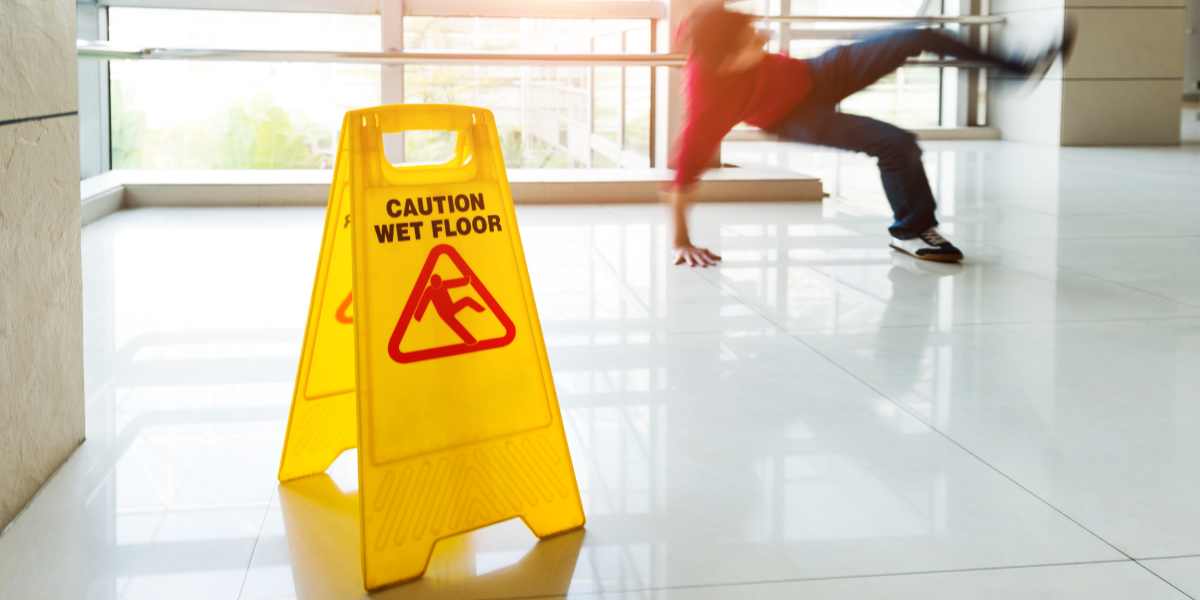According to the Food Marketing Institute, Americans make an average of 1.5 trips to the supermarket each week. Grocery stores across Georgia and much of the nation are busy on a daily basis, stocking over 40,000 items for sale and employing at least 50 staff members per shift. In the middle of all of this activity, accidents happen. A wide variety of slips, trips, and falls occur in supermarkets each day. Some well known supermarket chains have experienced high profile slip and falls, many of which result in substantial claims against the supermarket owner responsible.
There are two main causes of falls in grocery stores—slips and trips. Customers will often slip on slick surfaces within the store. Grocery store floors can become sippery due to spilled food, liquid, fallen produce, polish applied improperly, and mopping. Trips, alternatively, can result from misplaced items within the store or uneven surfaces, which could include poorly placed magazine racks or improperly rolled-out mats.
Georgia Premises Liability Law
Under Georgia law, slip and fall accidents will fall under the realm of premises liability law. Georgia premises liability law states that owners or occupiers of land can be liable for injuries to customers caused by the owner’s failure to exercise ordinary care in keeping the premises safe. Slip and fall accidents that occur in supermarkets can be complicated. Injured accident victims will need to establish that the supermarket owner, manager, or an employee failed to exercise ordinary care in keeping the premises safe.
Signs of failure to exercise ordinary care, otherwise referred to as negligence, include knowledge of a dangerous condition or constructive knowledge of such. Actual knowledge can be established by showing other customers complained of the dangerous condition which the owner failed to repair or when the owner or an agent of the owner created the dangerous condition. Constructive knowledge could be established by showing the dangerous condition existed for a considerable period of time.
The classic example of the dropped banana peel can illustrate the concept of constructive knowledge. If the banana peel that caused the grocery store slip and fall is dirty and black, this serves as evidence the peel has been on the ground for some time, which might be sufficient to prove constructive knowledge of the dangerous condition. If, on the other hand, the banana peel is bright yellow and clean, it might have just been dropped and the store may not have had time to realize it had fallen. This example is only meant to illustrate the concept of constructive knowledge and every case must be examined by a reputable personal injury attorney who can take the necessary steps to protect the injured person’s rights.
If you are injured in a grocery store slip and fall, contact a licensed attorney as soon as possible. Your attorney will investigate the accident, assist you in gathering evidence, and help you to pursue your accident claim.
Montlick Injury Attorneys, Attorneys at Law: Put Our Over 39 Years of Experience to Work on Your Case!
If you or a loved one is injured in a slip and fall accident due to suspected negligence, contact the Georgia Personal Injury Attorneys at Montlick Injury Attorneys, Attorneys at Law. Our law firm is dedicated to assisting injured victims across Georgia and in the Southeast. We bring over 39 years of experience to your premises liability case, striving to provide you with the exceptional representation you need to obtain the best possible outcome. The sooner you act after your accident, the greater your chances of obtaining a full recovery. As such, it is important that you seek the assistance of a licensed lawyer as soon as possible. Call Montlick Injury Attorneys, Attorneys at Law, 24 hours a day/7 days a week for your Free Consultation at 1-800-LAW-NEED® (1-800-529-6333). You can also visit us online at www.montlick.com and use our Free Case Evaluation Form or 24-hour Live Online Chat.
Source:
http://law.justia.com/codes/georgia/2010/title-51/chapter-3/article-1/51-3-1


